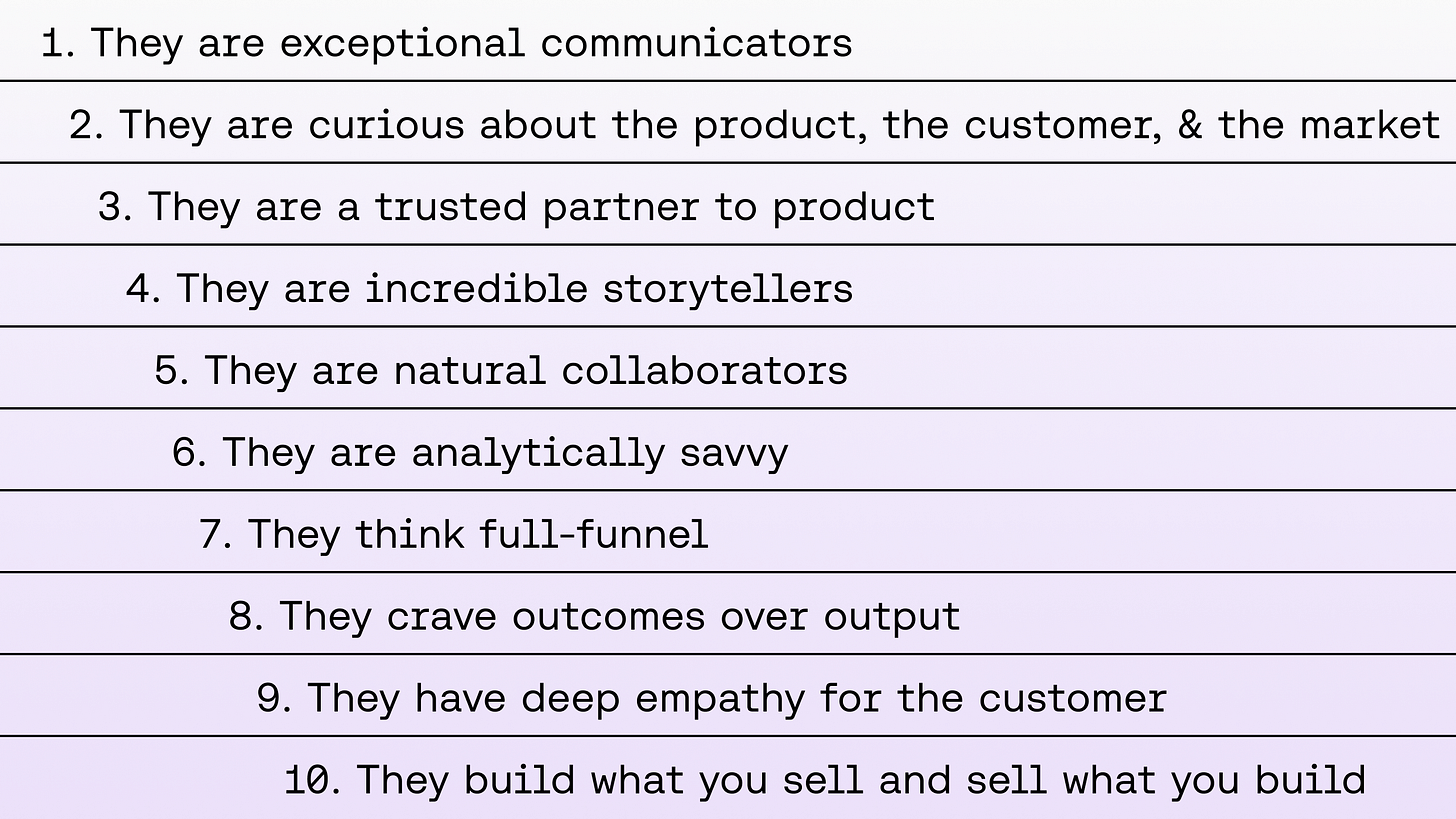Notorious: Hiring Your First (Product) Marketer
The best founders, startups, strategies, metrics and community. Every week.
Current subscribers: 9,590, +61 since last week
Share the love: please forward to colleagues and friends! 🙏
We have a special guest blog post today from Matt Hodges, Head of Product Marketing at Equals. I’ve featured Equals before and am a big fan of their product, team and marketing tactics. I often get asked what to look for in a startup’s first marketing hire and I think this is one of the best posts I’ve read on the topic. I hope you enjoy it, too:
Hiring Your First (Product) Marketer
“I'm hiring our first marketer. What do I need?”. I get asked this all the time. Here's my advice after 15 years of building teams at Atlassian, Intercom, and Loom, and advising early-stage founders.
I’ve built early marketing teams at three unicorns. I made some great hires and some not-so-great hires along the way. Some of the best went on to build teams of their own at Intercom, Figma, Loom, and Zapier. 15 years on, I‘ve formed some strong opinions on what to look for in your first marketing hire.
Start with a Product Marketer
I’m biased, but I’ve seen this movie enough times to have high confidence that you will rarely go wrong by making your first marketer a product marketer. Why? To answer that, we first need to take a step back and understand what we mean by marketing itself.
Unpacking “marketing”
It’s a loaded term. And it’s why almost every founder you ask will have a different answer to “What do you want from marketing?”. Some know. Some don’t. And it’s not surprising because marketing is multi-faceted.
I’ve written before about how marketing should be involved at every stage of the funnel, from the first point of contact to the decision to purchase to ongoing product education. That’s why it’s a mistake to think that marketing is a single team – it’s a function of many.
The fact is marketing is an umbrella term for many teams – each with differentiated sets of core skills – united around creating, capturing, and converting demand. So, why hire a product marketer first?
If you build it, they’ll come stick around
There’s no point in spending a bunch of money to acquire new customers if you haven’t figured out how to communicate what you’ve built and why people should care. People will land on your website and bounce. They’ll close the tab and move on with their lives. Product marketing can help prevent this.
The role of product marketing
There’s already plenty of great content out there about what product marketing is (👏The Product Marketer) and what it isn’t (👏Emily Kramer of MKT1). I won’t pile on. Instead, I’ll simply say this:
Product marketing should help you build what you sell and sell what you build
That’s something that every business needs. And it requires a specific type of individual. One that’s expected to wear many hats and be a jack of all trades. So, here’s what to look for when you’re trying to hire “the one”.
Top traits of the best product marketers
You’ve probably heard of an Ideal Customer Profile. Well, here’s my take on the Ideal PMM Profile:
1. They are exceptional communicators
They have world-class written, verbal, and visual communication skills. They can adapt to and win over both internal and external audiences.
2. They are curious about the product, the customer, and the market
They always have their finger on the pulse. This gives them intimate knowledge of the key ingredients for crafting compelling narratives and developing winning marketing (and product) strategies.
3. They are a trusted partner to product
They have opinions that are desired vs. required. They’re able to earn their seat at the product table. This puts them in a position to not just influence product strategy but actually help develop it.
4. They are incredible storytellers
They think creatively while maintaining clarity. They craft stories that command attention and motivate action. Whether the market is crowded or nascent, the best PMMs define and own their product's position in it.
5. They are natural collaborators
There are few roles more cross-functional in nature than product marketing. Knowing how to work well with others, but more importantly, with whom and when, is key to success and building trust.
6. They are analytically savvy
They might not know how to write SQL, but they can read and pull out insights from data, develop hypotheses and ask the right questions to validate or invalidate.
7. They think full-funnel
They care about the entire customer journey. They deeply understand what levers can be pulled to optimize each stage. No change is made without consideration for its impact on the experience as a whole.
8. They crave outcomes over output
They know that less can be more, know how and when to say no, and hold themselves and others accountable to measurable results.
9. They have deep empathy for the customer
They understand their wants, separate those from their needs, and always have an eye toward improving the customer experience, whether that be through marketing, product, or both.
10. They build what you sell and sell what you build
They know their role is getting people to understand what you're building. And why they should care about what you're building. They understand that product and marketing are two sides of the same coin.
Your mileage may vary
These are just my own opinions based on what I've learned building and growing product marketing teams at Atlassian, Intercom, and Loom. And from advising many founders at early-stage companies along the way.
There will always be many flavors of product marketing based on the specific needs and stage of the product and business. But, I strongly believe these characteristics to be universally true of the best product marketers regardless of their specific focus.
Happy hiring. And good luck.
Thanks for reading. By way of background, I am an early-stage investor at Wing and a former founder. Please reach out to me on X @zacharydewitt or at zach@wing.vc. Some of the early-stage PLG + AI companies that I have the privilege to work with and learn from are: AirOps, Copy.ai, Deepgram, Hireguide, Slang.ai, Standard Practice, Tango and Tome.
Operating Benchmarks (from PLG Startups):
I will continue to update these metrics and add new metrics. Let me know what metrics you want me to add (zach@wing.vc)
Organic Traffic (as % of all website traffic):
Great: 70%
Good: 50%
Conversion rate (website → free user):
Great: 10%
Good: 5%
Activation rate (free user → activated user):
Great: 50%
Good: 30%
Paid conversion rate (free user → paid user):
Freemium (Self Serve):
Great: 7%
Good: 4%
Freemium (Sales Assist):
Great: 12%
Good: 6%
Free Trial:
Great: 15%
Good: 8%
Reverse Trial:
Great: 15%
Good: 8%
Enterprise conversion rate (free user → enterprise plan):
Great: 4%
Good: 2%
3-month user retention (% of all users still using product after 3 months):
Great: 30%
Good: 15%
Conversion from waitlist to free user:
<1 month on waitlist: ~50%
>3 months on waitlist: 20%
For more detail on acqusition rates by channel (Organic, SEM, Social etc), please refer to this prior Notorious episode.
Financial Benchmarks (from PLG Public Companies):
Financial data as of previous business day market close.
Best-in-Class Benchmarking:
15 Highest EV/ NTM Revenue Multiples:
15 Biggest Stock Gainers (1 month):
Complete Dataset (click to zoom):
Note: TTM = Trailing Twelve Months; NTM = Next Twelve Months. Rule of 40 = TTM Revenue Growth % + FCF Margin %. GM-Adjusted CAC Payback = Change in Quarterly Revenue / (Gross Margin % * Prior Quarter Sales & Marketing Expense) * 12. Recent IPOs will have temporary “N/A”s as Wall Street Research has to wait to initiate converge.
Recent PLG + AI Financings:
Seed:
Archetype AI, a physical AI designed to provide an unprecedented understanding of the real world, has raised $13M. The round was led by Venrock, with participation from Amazon Industrial Innovation Fund, Hitachi Ventures, Buckley Ventures and Plug and Play Tech Center.
Knostic, an Israel-based provider of need-to-know access controls for Generative AI, has raised $3.3M. The round was led by Shield Capital, Pitango Venture Capital and DNX Ventures, with participation from Seedcamp.
Langdock, a platform empowering companies to leverage large language models while staying in control of their data, has raised $3M. The round was led by General Catalyst alongside La Famiglia, with participation from Y Combinator.
Libretto, a tool designed to monitor, test, and improve LLM prompts, has raised $3.7M. The round was led by XYZ Venture Capital and The General Partnership.
Neubird, a company that is building a generative AI solution for complex cloud-native environments, has raised $22M. Mayfield provided the funding.
PeerDB, a data movement platform intended to offer fast and cost-effective data replication to clients, has raised $3.6M. The round was led by 8VC, with participation from Wayfinder Ventures, Webb Investment Network, Flex Capital, Rogue Capital, Pioneer Fund, Y Combinator and Orange Collective.
Skeema, a browser copilot that helps organize users' digital information, has raised $1.5M. The round was led by Menlo Ventures.
Writ, a developer of a dashboard for the AI-infused era, has raised $3.8M. The round was led by Gradient Ventures, with participation from Defy Partners Management, High Alpha and Toba Capital.
Series A:
Loft Labs, a startup that makes virtualization tools for Kubernetes clusters, has raised $24M. The round was led by Khosla Ventures, with participation from Berkeley SkyDeck Fund, Emergent Ventures, Fusion Fund and Surface Ventures.
Symbolica, a company that uses AI to solve tasks by defining symbol-manipulating rule sets dedicated to particular jobs, has raised $33M. The round was led by Khosla Ventures, with participation from Abstract Ventures, Buckley Ventures, Day One Ventures and General Catalyst.
Series D:
Ramp, a NY-based corporate finance management startup, has raised $150M at a $7.65B valuation. The round was led by Khosla Ventures and Founders Fund, with Sequoia Capital, Greylock, 8VC, Thrive Capital, General Catalyst, Sands Capital, D1 Capital Partners, Lux Capital, Iconiq Capital, Definition Capital and Contrary Capital participating.










